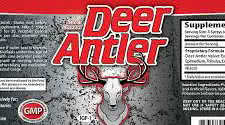Deer Antler Velvet - The Benefits of Velvet Supplement for a Bodybuilder

Supplements are the Key to Overall Nutrition Success
From traditional Chinese medicine comes the latest supplement being touted as a remedy for everything from joint pain
to a dull sexual life. And, yes, it's supposed to improve athletic performance as well.
Sound too good to be true? Could be, but it depends on whom you ask. According to the New Zealand Game Industry Board
(NZGIB), the proposition that this velvet may benefit athletes seems strained to say the least. However, historical
use and the latest studies suggest that, for some individuals, velvet may actually provide - albeit marginal - health
benefits.
Deer antler velvet, according to the NZGIB, "is the flame given to deer antlers in their early stages of growth, before
the antlers harden into bone. In the early stages of growth, antlers are soft tissues, covered with fine soft hair -
hence the name velvet." It is at this stage of growth that veterinarians or other specially trained individuals surgically
remove the animals' antlers under analgesic and antiseptic conditions. Pantocrine, a supplement that has come into vogue
more than once over the past 30 years, is the name given to an alcohol extract of red-deer antler velvet.
For thousands of years, antler has been considered an aphrodisiac and tonic - a preparation utilized throughout Asian
communities that is believed to enhance health and reproduction. However, Russian research done in the 1940's highlighted
the adaptogenic potential of the substance to enhance exercise recovery and perhaps increase performance.
This early work, plus anecdotal evidence that antler velvet may play a legitimate role as an effective health supplement
prompted the NZGIB to finance research designed to more clearly delineate the physiological/ health effects and active
ingredients of the substance.
The studies performed to date have been primarily on the composition of the material, as well as in vitro (test tube)
and on animals. Antler velvet is made of amino acids, lipids, minerals and trace minerals, and biologically significant
polypeptides (growth factors). In vitro and animal studies have investigated the effects of antler velvet on immune
function, whole body growth, hematology, cytotoxicity (anticancer effects) and joint health. Human trials are still sparse
and currently limited to aspects of exercise recovery.
Fundamentally, research indicates that 1,200 milligrams (mg) of velvet per day may positively affect humoral immunity
(in the blood) and red-blood-cell count as well as reduce exercise-induced muscle cell damage (shown as a decrease in
creatine phosphokinase). This is where bodybuilding benefits may be seen. Anything that reduces exercise-induced trauma
should help promote recovery and growth.
The latest studies using human subjects indicate no real positive effect on strength or lean mass. In addition, growth
factor (lGF-I) levels are not elevated by the daily use of 1,200mg of deer antler velvet. This puts to rest the theory
that velvet elevates serum levels of IGF-l, which in turn could produce an anabolic effect in muscle tissue.
THE BOTTOM LINE
The bare-bones minimum dose of deer antler velvet recommended by manufacturers, based on scientific as well as anecdotal evidence, is 1,200mg daily. That will set you back at least $2.40 per day.The question is whether the rather subtle effects of this supplement are worth it for athletes who have other proven ergogenic aids at their disposal. Probably not Based on the recent research on deer antler velvet as well as on anecdotal data on pantocrine, your supplement dollar is better spent on "standard issue" aids: protein, creatine, glutamine, vitamins / minerals / antioxidants, thermogenics, prohormones and beta-hydroxy beta-methylbutyrate (HMB).